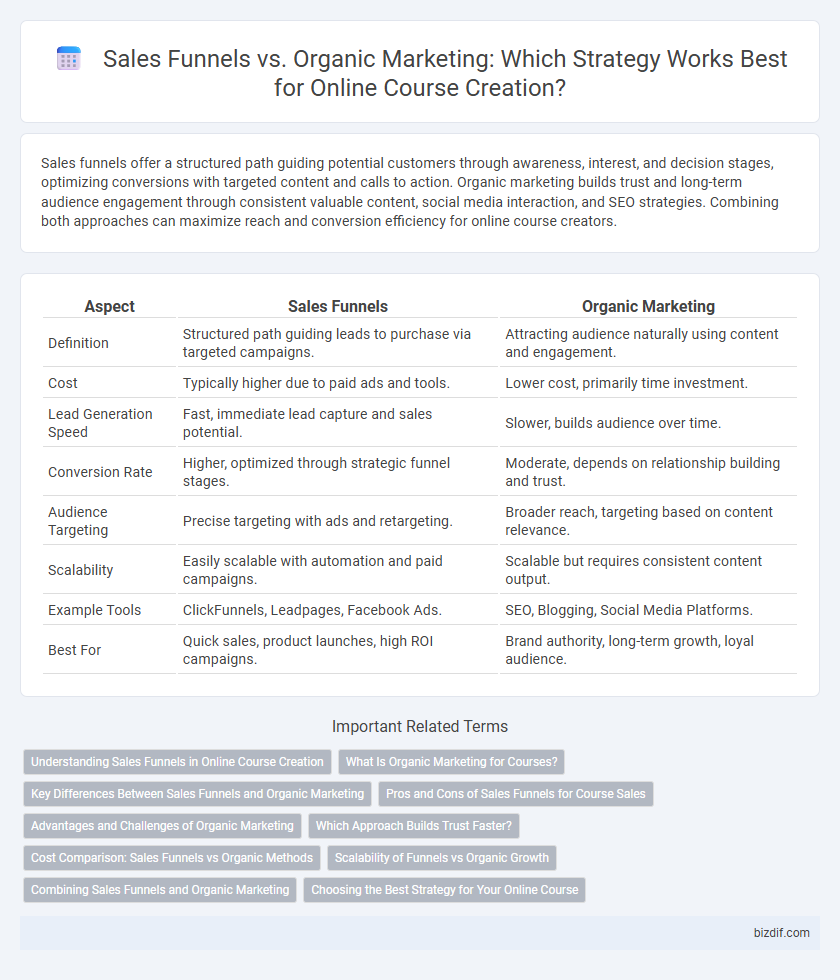Sales funnels offer a structured path guiding potential customers through awareness, interest, and decision stages, optimizing conversions with targeted content and calls to action. Organic marketing builds trust and long-term audience engagement through consistent valuable content, social media interaction, and SEO strategies. Combining both approaches can maximize reach and conversion efficiency for online course creators.
Table of Comparison
| Aspect | Sales Funnels | Organic Marketing |
|---|---|---|
| Definition | Structured path guiding leads to purchase via targeted campaigns. | Attracting audience naturally using content and engagement. |
| Cost | Typically higher due to paid ads and tools. | Lower cost, primarily time investment. |
| Lead Generation Speed | Fast, immediate lead capture and sales potential. | Slower, builds audience over time. |
| Conversion Rate | Higher, optimized through strategic funnel stages. | Moderate, depends on relationship building and trust. |
| Audience Targeting | Precise targeting with ads and retargeting. | Broader reach, targeting based on content relevance. |
| Scalability | Easily scalable with automation and paid campaigns. | Scalable but requires consistent content output. |
| Example Tools | ClickFunnels, Leadpages, Facebook Ads. | SEO, Blogging, Social Media Platforms. |
| Best For | Quick sales, product launches, high ROI campaigns. | Brand authority, long-term growth, loyal audience. |
Understanding Sales Funnels in Online Course Creation
Sales funnels in online course creation strategically guide potential students from awareness to enrollment through targeted stages like lead generation, nurturing, and conversion. This method leverages tools such as email marketing, landing pages, and automated follow-ups to maximize course sign-ups and revenue. Understanding the funnel process allows course creators to optimize marketing efforts, measure conversion rates, and scale their business effectively.
What Is Organic Marketing for Courses?
Organic marketing for online courses involves attracting potential students through non-paid channels like content marketing, social media engagement, and SEO optimization. It emphasizes building trust and authority by providing valuable course-related content, which naturally draws learners without relying on paid advertisements. This approach fosters sustainable growth by cultivating an authentic audience interested in the course material.
Key Differences Between Sales Funnels and Organic Marketing
Sales funnels use structured steps to guide potential customers toward a purchase through targeted ads, landing pages, and email sequences, optimizing conversion rates with measurable touchpoints. Organic marketing relies on content creation, social media engagement, and SEO to attract and nurture audiences naturally over time without paid promotion. The key difference lies in sales funnels' focused, data-driven approach for immediate conversions versus organic marketing's sustained, relationship-building strategy that grows brand authority and audience trust.
Pros and Cons of Sales Funnels for Course Sales
Sales funnels for online course sales streamline the customer journey, boosting conversion rates by guiding prospects from awareness to purchase with targeted content and offers. They enable precise tracking of user behavior and data-driven optimization, but require upfront investment in software, design, and ongoing management. However, sales funnels can feel impersonal to some buyers compared to organic marketing approaches that build trust through authentic engagement and community interaction.
Advantages and Challenges of Organic Marketing
Organic marketing in online course creation leverages content marketing, social media engagement, and SEO to attract authentic, long-term audience interest without direct advertising costs. Advantages include higher trust and stronger community relationships, as learners find courses through genuine recommendations and valuable content. Challenges involve slower audience growth and the need for consistent, high-quality content to maintain visibility in competitive digital spaces.
Which Approach Builds Trust Faster?
Sales funnels build trust faster by guiding prospects through a structured journey with targeted messaging and personalized content, accelerating decision-making. Organic marketing fosters trust through consistent value delivery and authentic engagement, but the process is typically slower and requires sustained effort. Combining both strategies optimizes trust-building by leveraging the immediacy of sales funnels and the credibility of organic connections.
Cost Comparison: Sales Funnels vs Organic Methods
Sales funnels often require upfront investment in paid ads, software tools, and design services, resulting in higher initial costs compared to organic marketing methods. Organic strategies leverage content marketing, social media engagement, and SEO, which primarily demand time and effort rather than significant financial outlay. Over time, organic marketing can provide a cost-effective way to build a sustainable audience without ongoing ad spend.
Scalability of Funnels vs Organic Growth
Sales funnels offer predictable scalability through automated, targeted steps designed to convert leads into paying customers efficiently. Organic marketing relies on long-term relationship building and content creation, which scales more gradually but fosters sustained engagement. Leveraging sales funnels accelerates revenue growth, while organic marketing strengthens brand authority over time.
Combining Sales Funnels and Organic Marketing
Combining sales funnels and organic marketing amplifies online course creation success by leveraging targeted lead capture with authentic audience engagement. Sales funnels efficiently guide potential students through a structured buying journey, while organic marketing builds trust and community through valuable content and social proof. Integrating these strategies maximizes conversion rates and long-term course enrollments by balancing paid funnel precision with loyal organic reach.
Choosing the Best Strategy for Your Online Course
Sales funnels provide a structured pathway that guides potential students from awareness to enrollment through targeted email sequences, landing pages, and paid ads, maximizing conversion rates for online course creators. Organic marketing relies on content marketing, SEO, and social media engagement to build trust and attract an authentic audience over time without direct advertising costs. Selecting the best strategy depends on budget, timeline, and long-term goals, with many successful course creators integrating both to balance immediate sales with sustained organic growth.
Sales funnels vs Organic marketing Infographic

 bizdif.com
bizdif.com